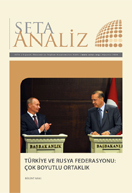Turkey's relations with NATO in parallel to signs that the United States and the European Union have embarked on a process of greater transatlantic integration demands closer attention
Certain developments such as the Turkish Parliament's March 1, 2003, decision to deny the U.S. the use of its territory in the Iraq war, the U.S. invasion of Iraq, France's decision to return to NATO's military wing, and the presence of NATO's naval vessels on the Black Sea, have been perceived as defining a period where Turkey is diverging from NATO's periphery. The ways in which the policies of Turkey and NATO regarding the Black Sea issue differ, Turkey's position concerning Afghanistan and the Caucasus, and how certain developments have reflected on Turkey-NATO relations is important. With the new Turkish foreign policy concept theorized by Professor Ahmet Davutoglu, chief foreign policy advisor to Prime Minister Recep Tayyip Erdogan, Turkey is increasingly adopting a multi-regional perspective, encompassing Europe, the Balkans, Asia, the Middle East, the Black Sea, and the Mediterranean, conceptualized as Afro-Asia. The underlying logic is that Turkey cannot be defined as belonging to one geographic region alone and this necessitates it to act multilaterally in its foreign policy approach. In practice, this leads to a moment where Turkey cannot depend solely on a one-bloc alliance-the days where Turkey had this luxury are over. This reality forces Turkey to pursue broader, multi-regional policies and is an indication that its relations with its "old partners" will not be the same again.
In spite of the NATO presence in the Black Sea subsequent to the Russian-Georgian clash in the Caucasus, Turkey's neutral position, grounded in the Montreux Convention, resulted in some questions in the alliance relating to Turkey. NATO's entrance into what can be called a period of U.S.-EU integration with President Nicolas Sarkozy's acknowledgement that France will return to NATO's military wing represents a critical turning point in relations between NATO and Turkey. In the coming days, especially on the occasion of NATO's 60th anniversary summit, where the last step of this process will be taken upon France's formal acceptance, Turkey's role will gain importance. For this reason, Turkey should evaluate the process around the transformation of NATO into a U.S.-EU strategic alliance carefully.
Founded in 1949, NATO had faced its first major crisis in 1966 when Charles de Gaulle's France decided to withdraw from NATO's military wing. Later, when France moved forward with the creation of the European Security and Defence Policy (ESDP) independent from the U.S. and NATO, and took a major step in formulating the process in 1993, tensions reached a climax. The European-Atlantic Partnership Council was founded in 1997 in order to settle the deficit between NATO and the EU on the issue of a security structure. The Council, which stands at the core of transatlantic relations, is a crucial undertaking in sustaining U.S.-EU cohesion within NATO. Conversely, 2003 was a milestone year because it marked conflicting interests between the U.S. and EU in NATO. With the round of NATO's enlargement in 2004, the U.S. divided the EU into two new axes, between old and new members. These developments resulted in the emergence of a duality in NATO's transatlantic relations and a crisis in the functioning of the organization. Such an impasse in NATO led the U.S. to function outside the NATO command structure within the concept of coalition forces and the "coalition of the willing" which led to criticism that the alliance was insufficient in dealing with international security questions.
NATO's transformation into a U.S.-EU alliance
Together with Obama's election as U.S. president, not only the failures of the Bush administration, but also the global financial crises and its far reaching impact, forced a crucial amelioration of transatlantic relations between the U.S., NATO and the EU. This transformation has to do with developments taki









